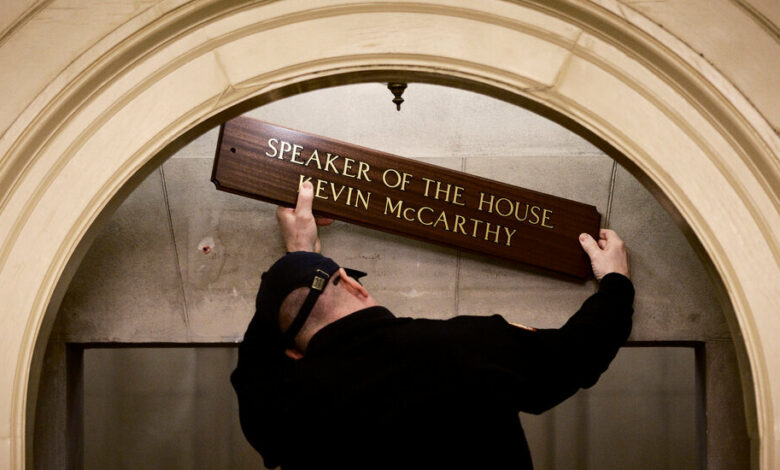McCarthy’s Revenge Tour Continues, With Mixed Results

During the awkward interlude after he was removed as Speaker but before he resigned as Congressman, Kevin McCarthy stood on the floor of the House of Representatives one afternoon next to Representative Bob Good of Virginia, one of eight Republicans who voted to remove him from power.
“I have just traveled to your district,” Mr. McCarthy said, still reeling from his political downfall, in what was interpreted as a vaguely menacing tone. “It is a very beautiful district.”
“Why don’t you come down and spend your money there?” Mr. Good, the chairman of the far-right House Freedom Caucus, mocked Mr. McCarthy in response.
“Oh, I will,” Mr. McCarthy shot back. “I might as well spend $5 million on it.”
In this case, Mr. McCarthy kept his word.
In the months that followed, he helped pour more than $6 million into the race to defeat Mr. Good, who is now fighting to retain his seat after falling 375 votes short in his recent primary against a Trump-backed challenger, John J. McGuire. (Mr. Good’s campaign is paying for a recount, and he alleges there was “improper activity” at polls in Lynchburg, the district’s largest city.)
McCarthy’s campaign to topple Mr. Good was just one part of a vast and expensive revenge campaign he has waged since leaving Congress, a campaign aimed at destroying the Republicans he blames for his downfall.
“Bob Good is defeated, but the loser can’t accept that yet,” said Brian O. Walsh, a key McCarthy ally who is coordinating the former chairman’s efforts to unseat the so-called “Crazy Eight” Republicans who opposed him.
Mr. McCarthy declined to comment for this story, but Mr. Walsh made clear that the former speaker was seeking retribution and did little to hide it. “We said there would be consequences,” Mr. Walsh said, “and we’re being persistent and very patient.”
Mr. McCarthy spent more than $4 million in an unsuccessful bid to defeat Representative Nancy Mace of South Carolina in her primary last month, and his allies are now promoting ethics charges against her in hopes of making her unelectable in the future. He and his allies are backing a challenger to Representative Eli Crane of Arizona, the only Republican in his first term to vote to remove Mr. McCarthy, who faces a primary in August. And Mr. McCarthy is going after Representative Matt Gaetz of Florida, his chief tormentor and the leader of the effort to unseat him, pushing allegations that Mr. Gaetz had sex with an underage girl.
Representative Matt Rosendale of Montana, another Republican who voted to unseat the former chairman, abruptly dropped his reelection bid in March amid rumors that he had an affair with a staffer. Mr. Walsh declined to comment on whether Mr. McCarthy and those close to him had anything to do with that decision. But Mr. Rosendale’s decision saved them millions of dollars.
It’s a whole new role for a man known best as a carefree political operator, a consummate team player and a prodigious fundraiser, whose paid speeches since leaving Congress include one titled “The Happy Warrior Leadership Mindset.” Now, determined to settle his own political scores, Mr. McCarthy has maneuvered himself into a high-stakes election cycle in which Republicans are pushing to win control of the White House and both chambers of Congress.
In addition to pouring millions of dollars into the race against Mr. Good, Mr. McCarthy urged former President Donald J. Trump to support Mr. McGuire, a right-wing election-denier who had few policy differences with the incumbent president. He tried to get Virginia Gov. Glenn Youngkin to run against Mr. Good, but failed. Still, he and his allies are pleased with their results, even if Mr. McGuire did not win a decisive victory.
The neck-and-neck race was in some ways more satisfying than an outright victory, they said, because the situation leaves Mr. Good losing both his race and his mind.
There are more targets in the offing, including Mr. Crane, who said in an interview that he had expected this.
“You make your bed, you sleep in it,” said Mr. Crane, who insisted he was not worried about the primary challenge against him, largely because his Republican rival is named Jack Smith, the same name as the special counsel prosecuting Mr. Trump.
“That doesn’t go over well in a Republican primary anywhere in the country,” Mr. Crane said. “I wouldn’t be surprised if the swamp gets me one day. Maybe it’ll be the next round. But I remind myself that it’s OK. I came here to shake things up.”
On Saturday, Mr. Walsh’s group released a television ad attacking Mr. Gaetz ahead of his August primary against a little-known challenger, Aaron Dimmock, a retired Navy officer and pilot. The ad focuses on Mr. Gaetz’s close friendship with Joel Greenberg, the Florida tax collector who was sentenced to 11 years in prison for human trafficking of a 17-year-old girl and a string of other crimes.
In his public speeches, Mr. McCarthy often takes aim at Mr. Gaetz, claiming that the only reason he was ousted was because the Florida congressman “wanted me to drop an ethics complaint about him sleeping with a 17-year-old.” Mr. Gaetz has denied those claims, and the Justice Department investigated them and declined to charge him. But Mr. McCarthy and his allies have quietly tried to fuel a separate investigation into the matter by the House Ethics Committee.
McCarthy’s former aides and friends have gently encouraged him not to sound so bitter and preoccupied with Mr. Gaetz. But Mr. McCarthy is committed to the bit, telling people that he wants to publicly define Mr. Gaetz and prevent him from ever running for office in the entire state, even if it will be nearly impossible to defeat him in a congressional primary.
Sarah Chamberlain, chair of the Republican Main Street Partnership, said McCarthy had the right to run in any primary he wanted.
“He raises the money; he can do with it what he wants,” said Ms. Chamberlain, whose group backed Mr. McGuire even though he is far to the right of the mainstream candidates they typically support. “He was the first speaker to be dismissed in a way that probably wasn’t very fair to him, and it’s his prerogative to deal with it as he sees fit.”
Once by far the biggest fundraiser among Republicans in the House, Mr. McCarthy isn’t just out for revenge. He’s still helping raise money for the Congressional Leadership Fund, an outside group that supports vulnerable Republicans in the House. And he’s still making personal appearances for members he likes. (A spokeswoman for the Congressional Leadership Fund declined to provide a figure for how much Mr. McCarthy has raised for the group since leaving office.)
He recently headlined a fundraiser in Omaha for Rep. Don Bacon, who represents a district that President Biden won by six points in 2020, and a fundraiser in Los Angeles for Rep. Max Miller of Ohio. McCarthy still prides himself on being the largest donor to the National Republican Campaign Committee, even after nine months out of office.
What has most excited him, however, is the prospect of accountability for those he believes have wronged him. The mixed results of Mr. McCarthy’s revenge tour so far show how difficult it is to unseat incumbents who have taken steps to appeal to the party’s far-right base.
Two of the Republicans who voted to impeach him, Reps. Tim Burchett of Tennessee and Andy Biggs of Arizona, are not running in the primary. A third, Rep. Ken Buck of Colorado, left Congress of his own accord earlier this year.
Others proved harder to beat. Ms. Mace won her primary easily by 27 points, and many voters in her district said her vote to oust Mr. McCarthy was what convinced them.
Lynn Fontaine, the southern regional director of the Beaufort County Republican Party, said most of her friends and neighbors in Hilton Head couldn’t stand Ms. Mace because she criticized Mr. Trump after the Jan. 6, 2021, attack on the Capitol, but that “Mace’s vote against McCarthy was a redemptive moment for her.”
Stephen K. Bannon, who used his podcast “War Room” to push for McCarthy’s resignation and campaigned for Good, called McCarthy a “wasted force” in Republican politics.
“He’s as toxic to the Republican voter base as Nancy Pelosi,” Bannon said.
Mr Crane said the money spent on defeating him could be spent in more productive ways.
“Look at the bigger picture: What could that money have done to help, and not go on a revenge tour?” he said.




